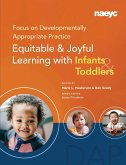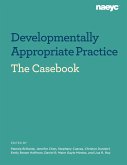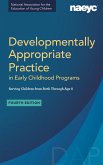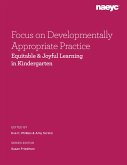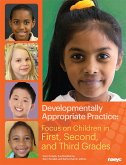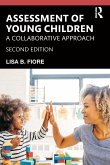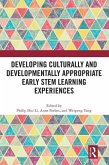Focus on Developmentally Appropriate Practice
Equitable and Joyful Learning in Preschool
Herausgeber: Alanís, Iliana; Sturdivant, Toni
Focus on Developmentally Appropriate Practice
Equitable and Joyful Learning in Preschool
Herausgeber: Alanís, Iliana; Sturdivant, Toni
- Broschiertes Buch
- Merkliste
- Auf die Merkliste
- Bewerten Bewerten
- Teilen
- Produkt teilen
- Produkterinnerung
- Produkterinnerung
What Does Developmentally Appropriate Practice Look Like in a Preschool Classroom? If you’ve ever wondered how effective teachers actually do DAP, this is the book for you. Here, you can peek into classrooms to see teachers making intentional decisions in the six key areas of practice that form the six guidelines for DAP in action: 1. Building a community of learners where everyone is welcomed and supported to grow 2. Facilitating respectful partnerships with families 3. Observing, assessing, and documenting children’s development and learning 4. Using teaching strategies that…mehr
Andere Kunden interessierten sich auch für
![Focus on Developmentally Appropriate Practice Focus on Developmentally Appropriate Practice]() Focus on Developmentally Appropriate Practice27,99 €
Focus on Developmentally Appropriate Practice27,99 €![Casebook: Developmentally Appropriate Practice in Early Childhood Programs Serving Children from Birth Through Age 8 Casebook: Developmentally Appropriate Practice in Early Childhood Programs Serving Children from Birth Through Age 8]() Casebook: Developmentally Appropriate Practice in Early Childhood Programs Serving Children from Birth Through Age 835,99 €
Casebook: Developmentally Appropriate Practice in Early Childhood Programs Serving Children from Birth Through Age 835,99 €![Developmentally Appropriate Practice in Early Childhood Programs Serving Children from Birth Through Age 8, Fourth Edition (Fully Revised and Updated) Developmentally Appropriate Practice in Early Childhood Programs Serving Children from Birth Through Age 8, Fourth Edition (Fully Revised and Updated)]() NaeycDevelopmentally Appropriate Practice in Early Childhood Programs Serving Children from Birth Through Age 8, Fourth Edition (Fully Revised and Updated)64,99 €
NaeycDevelopmentally Appropriate Practice in Early Childhood Programs Serving Children from Birth Through Age 8, Fourth Edition (Fully Revised and Updated)64,99 €![Focus on Developmentally Appropriate Practice Focus on Developmentally Appropriate Practice]() Focus on Developmentally Appropriate Practice34,99 €
Focus on Developmentally Appropriate Practice34,99 €![Developmentally Appropriate Practice Developmentally Appropriate Practice]() Sue BredekampDevelopmentally Appropriate Practice43,99 €
Sue BredekampDevelopmentally Appropriate Practice43,99 €![Assessment of Young Children Assessment of Young Children]() Lisa B. Fiore (USA Lesley University)Assessment of Young Children54,99 €
Lisa B. Fiore (USA Lesley University)Assessment of Young Children54,99 €![Developing Culturally and Developmentally Appropriate Early STEM Learning Experiences Developing Culturally and Developmentally Appropriate Early STEM Learning Experiences]() Developing Culturally and Developmentally Appropriate Early STEM Learning Experiences154,99 €
Developing Culturally and Developmentally Appropriate Early STEM Learning Experiences154,99 €-
-
-
What Does Developmentally Appropriate Practice Look Like in a Preschool Classroom? If you’ve ever wondered how effective teachers actually do DAP, this is the book for you. Here, you can peek into classrooms to see teachers making intentional decisions in the six key areas of practice that form the six guidelines for DAP in action: 1. Building a community of learners where everyone is welcomed and supported to grow 2. Facilitating respectful partnerships with families 3. Observing, assessing, and documenting children’s development and learning 4. Using teaching strategies that enhance learning for each child 5. Implementing curriculum tied to meaningful learning goals 6. Demonstrating professionalism You’ll discover * More about what each guideline means for preschool teaching * Chapters that showcase articles from Young Children and Teaching Young Children—plus brand-new content—illustrating excellent teaching strategies related to each guideline * Examples you can model, adapt, and implement in your own practice Your teaching will be richer and deeper, and children’s learning will flourish!
Produktdetails
- Produktdetails
- Focus on DAP: Equitable and Joyful Learning
- Verlag: National Association for the Education of Young Children
- Seitenzahl: 196
- Erscheinungstermin: 25. April 2023
- Englisch
- Abmessung: 272mm x 208mm x 10mm
- Gewicht: 484g
- ISBN-13: 9781952331107
- ISBN-10: 1952331102
- Artikelnr.: 63367351
- Herstellerkennzeichnung
- Libri GmbH
- Europaallee 1
- 36244 Bad Hersfeld
- gpsr@libri.de
- Focus on DAP: Equitable and Joyful Learning
- Verlag: National Association for the Education of Young Children
- Seitenzahl: 196
- Erscheinungstermin: 25. April 2023
- Englisch
- Abmessung: 272mm x 208mm x 10mm
- Gewicht: 484g
- ISBN-13: 9781952331107
- ISBN-10: 1952331102
- Artikelnr.: 63367351
- Herstellerkennzeichnung
- Libri GmbH
- Europaallee 1
- 36244 Bad Hersfeld
- gpsr@libri.de
Volume editors: Iliana Alanís, PhD, a native of South Texas, is professor of early childhood and elementary education in the Department of Interdisciplinary Learning and Teaching at the University of Texas at San Antonio. With over 20 years in the early childhood field, her work focuses on teaching practices in culturally and linguistically diverse early childhood contexts with an emphasis on the effect of schooling for language minority children in Spanish/English dual language programs. She is especially interested in forms of teaching that promote native language development and its correlation to second language acquisition. With more than 48 refereed publications related to dual language education, her recent research focuses on higher- order cognitive and linguistic interaction found in student–student exchanges. Dr. Alanís is former president of the Texas Association for Bilingual Education and former board member for the National Latino Children’s Institute. She has served as a NAEYC Governing Board member and an Early Childhood Advisory Board member for Scholastic Education. As a member of the Dual Language Training Institute, she facilitates professional development for teachers in dual language classrooms across the country. Dr. Alanís is coauthor of The Essentials: Supporting Dual Language Learners in Diverse Environments in Preschool and Kindergarten. Toni Sturdivant, PhD, is the vice president of early education at Camp Fire First Texas. She earned a PhD in interdisciplinary learning and teaching with a cognate in early childhood education. In addition, she has a master’s degree in early childhood and elementary education with a specialization in child development. She earned a BA in linguistics with a minor in African and African American studies. Dr. Sturdivant has taught prekindergarten in both an urban school district and a center- based setting, as well as kindergarten. She has served as a trainer for practicing early childhood teachers and taught preservice teachers in various institutions of higher education. Her research, which focuses on issues of racial learning and racial identity with young children and culturally relevant teaching practices, has been published in several scholarly journals, such as Early Childhood Education Journal, The Journal for Multicultural Education, International Journal of Early Childhood, and Young Children. Series editor Susan Friedman is senior director of publishing and content development at NAEYC. In this role, she leads the content development work of NAEYC’s books and periodicals teams. Ms. Friedman is coeditor of Each and Every Child: Teaching Preschool with an Equity Lens. She has extensive prior experience creating content on play, developmentally appropriate uses of media, and other topics for educators and families. She has presented at numerous educational conferences, including NAEYC’s Professional Learning Institute and Annual Conference, the South by Southwest Education (SXSW EDU) Conference & Festival, and the School Superintendents Association’s Early Learning Cohort. She began her career as a preschool teacher at City and Country School in New York City. She holds degrees from Vassar College and the Harvard Graduate School of Education.
* About the Editors
* Focus on Developmentally Appropriate Practice: Equitable and Joyful
Learning Book Series
* Developmentally Appropriate Practice: An Introduction
* Developmentally Appropriate Practice in Preschool
* Part 1: Creating a Caring, Equitable Community of Learners
* Chapter 1: The Power of “Good Morning” Sarah Calzone
* Chapter 2: Every Child Belongs: Welcoming a Child with a Disability
Pamela Brillante
* Chapter 3: Will You Pass the Peas, Please? Nikki Waldron
* Chapter 4: Instead of Discipline, Use Guidance Dan Gartrell
* Chapter 5: Preventing Exclusionary Discipline Practices in Early
Childhood Sarah C. Wymer, Amanda P. Williford, and Ann S.
Lhospital
* Part 2: Engaging in Reciprocal Partnerships with Families and
Fostering Community Connections
* Chapter 6: 5 Rs for Promoting Positive Family Engagement Bweikia
Foster Steen
* Chapter 7: Many Languages, One Community: Engaging All Families
Lorraine Cooke
* Chapter 8: Integrating Families’ Funds of Knowledge into Daily
Teaching Practices Iliana Alanís and Irasema Salinas-González
* Chapter 9: Building Relationships: The Key to Engaging Fathers
Lindsey L. Wilson and Holly S. Schindler
* Chapter 10: Learning with Families About the Contexts of Young
Bilingual Children with Disabilities Cristina Gillanders and Sylvia
Y. Sánchez
* Chapter 11: Promoting Linguistic Diversity and Equity: Teaching in
Multilingual Learning Spaces Carola Oliva-Olson, Linda M. Espinosa,
Whit Hayslip, and Elizabeth S. Magruder
* Part 3: Observing, Documenting, and Assessing Children’s Development
and Learning
* Chapter 12: Practical Approaches to Informal Assessment of STEAM
Experiences Angela Eckhoff and Sandra M. Linder
* Chapter 13: Anecdotal Records: Practical Strategies for Taking
Meaningful Notes Celeste C. Bates, Stephanie Madison Schenck, and
Hayley J. Hoover
* Chapter 14: Developmental Moments: Teacher Decision Making to Support
Young Writers Kathryn F. Whitmore and Lori Norton-Meier
* Chapter 15: Authentic and Meaningful Developmental Screening in Early
Childhood Marisa Macy and Stefano J. Bagnato
* Chapter 16: Learning Stories: A Framework for Authentic Assessment
and Critical Pedagogy Isauro M. Escamilla, Linda R. Kroll, Daniel
R. Meier, and Annie White
* Chapter 16 Appendix: Ellie’s Learning Story: “種植 Planting”
* Part 4: Teaching to Enhance Each Child’s Development and Learning
* Chapter 17: The Power of Science: Using Inquiry Thinking to Enhance
Learning in a Dual Language Preschool Classroom Leanne M. Evans
* Chapter 18: A Guided, Exploration-Based Visual Arts Program for
Preschoolers X. Christine Wang, Keely Benson, Corinne Eggleston,
and Bin Lin
* Chapter 19: Supporting Positive Racial Identity with Literacy-Based
Math Toni Sturdivant
* Chapter 20: Meaningful Talk: The Importance of Using Sophisticated
Language at Preschool Tracy Weippert
* Chapter 21: Using Nature Contact to Support Children Under Stress
Becky L. DelVecchio, Susan Ferguson, and Wesley Knapp
* Chapter 22: Timing Is Everything: Understanding the Importance of
Timing, Length, and Sequence of Activities Monica Lesperance
* Part 5: Planning and Implementing an Engaging Curriculum to Achieve
Meaningful Goals
* Chapter 23: Never Too Young to Champion a Cause: Supporting Positive
Identity Development Through Social Justice Curriculum in Preschool
Veronica Benavides, Roxanne Ledda, and Maimuna Mohammed
* Chapter 24: Diverse Children, Uniform Standards: Using Early Learning
and Development Standards in Multicultural Classrooms Jeanne L.
Reid, Catherine Scott-Little, and Sharon Lynn Kagan
* Chapter 25: Preschool in the Park: Place-Based Learning in Unexpected
Spaces Rachel J. Franz
* Chapter 26: Metamorphosis: Life Cycle in a Box Sara Starbuck
* Chapter 27: Listen to What We Hear: Developing Community Responsive
Listening Centers Emily Brown Hoffman and Kristin Cipollone
* Chapter 28: Walk with Us: Indigenous Approaches to Developmentally
Appropriate Practice Trisha L. Moquino, Joshuaa D. Allison-Burbank,
Rebecca Blum-Martinez, and Katie Kitchens
* Part 6: Demonstrating Professionalism as an Early Childhood Educator
* Chapter 29: Becoming Your Best: Building Professional Competencies
Meghann Hickey
* Chapter 30: Personalized Professional Development: How Teachers Can
Use Videos to Improve Their Practice Rachel E. Schachter and Hope
Kenarr Gerde
* Chapter 31: Leading with LOVE: Leveraging Our Value Every Day Chaz
Simmons
* Chapter 32: Beginning (or Continuing) the Journey to a More Equitable
Classroom Janis Strasser and Llariley Coplin
* Chapter 33: Incorporating Anti-Racist Approaches for Asian American
Children Shu-Chen “Jenny” Yen
* References
* Index
* Focus on Developmentally Appropriate Practice: Equitable and Joyful
Learning Book Series
* Developmentally Appropriate Practice: An Introduction
* Developmentally Appropriate Practice in Preschool
* Part 1: Creating a Caring, Equitable Community of Learners
* Chapter 1: The Power of “Good Morning” Sarah Calzone
* Chapter 2: Every Child Belongs: Welcoming a Child with a Disability
Pamela Brillante
* Chapter 3: Will You Pass the Peas, Please? Nikki Waldron
* Chapter 4: Instead of Discipline, Use Guidance Dan Gartrell
* Chapter 5: Preventing Exclusionary Discipline Practices in Early
Childhood Sarah C. Wymer, Amanda P. Williford, and Ann S.
Lhospital
* Part 2: Engaging in Reciprocal Partnerships with Families and
Fostering Community Connections
* Chapter 6: 5 Rs for Promoting Positive Family Engagement Bweikia
Foster Steen
* Chapter 7: Many Languages, One Community: Engaging All Families
Lorraine Cooke
* Chapter 8: Integrating Families’ Funds of Knowledge into Daily
Teaching Practices Iliana Alanís and Irasema Salinas-González
* Chapter 9: Building Relationships: The Key to Engaging Fathers
Lindsey L. Wilson and Holly S. Schindler
* Chapter 10: Learning with Families About the Contexts of Young
Bilingual Children with Disabilities Cristina Gillanders and Sylvia
Y. Sánchez
* Chapter 11: Promoting Linguistic Diversity and Equity: Teaching in
Multilingual Learning Spaces Carola Oliva-Olson, Linda M. Espinosa,
Whit Hayslip, and Elizabeth S. Magruder
* Part 3: Observing, Documenting, and Assessing Children’s Development
and Learning
* Chapter 12: Practical Approaches to Informal Assessment of STEAM
Experiences Angela Eckhoff and Sandra M. Linder
* Chapter 13: Anecdotal Records: Practical Strategies for Taking
Meaningful Notes Celeste C. Bates, Stephanie Madison Schenck, and
Hayley J. Hoover
* Chapter 14: Developmental Moments: Teacher Decision Making to Support
Young Writers Kathryn F. Whitmore and Lori Norton-Meier
* Chapter 15: Authentic and Meaningful Developmental Screening in Early
Childhood Marisa Macy and Stefano J. Bagnato
* Chapter 16: Learning Stories: A Framework for Authentic Assessment
and Critical Pedagogy Isauro M. Escamilla, Linda R. Kroll, Daniel
R. Meier, and Annie White
* Chapter 16 Appendix: Ellie’s Learning Story: “種植 Planting”
* Part 4: Teaching to Enhance Each Child’s Development and Learning
* Chapter 17: The Power of Science: Using Inquiry Thinking to Enhance
Learning in a Dual Language Preschool Classroom Leanne M. Evans
* Chapter 18: A Guided, Exploration-Based Visual Arts Program for
Preschoolers X. Christine Wang, Keely Benson, Corinne Eggleston,
and Bin Lin
* Chapter 19: Supporting Positive Racial Identity with Literacy-Based
Math Toni Sturdivant
* Chapter 20: Meaningful Talk: The Importance of Using Sophisticated
Language at Preschool Tracy Weippert
* Chapter 21: Using Nature Contact to Support Children Under Stress
Becky L. DelVecchio, Susan Ferguson, and Wesley Knapp
* Chapter 22: Timing Is Everything: Understanding the Importance of
Timing, Length, and Sequence of Activities Monica Lesperance
* Part 5: Planning and Implementing an Engaging Curriculum to Achieve
Meaningful Goals
* Chapter 23: Never Too Young to Champion a Cause: Supporting Positive
Identity Development Through Social Justice Curriculum in Preschool
Veronica Benavides, Roxanne Ledda, and Maimuna Mohammed
* Chapter 24: Diverse Children, Uniform Standards: Using Early Learning
and Development Standards in Multicultural Classrooms Jeanne L.
Reid, Catherine Scott-Little, and Sharon Lynn Kagan
* Chapter 25: Preschool in the Park: Place-Based Learning in Unexpected
Spaces Rachel J. Franz
* Chapter 26: Metamorphosis: Life Cycle in a Box Sara Starbuck
* Chapter 27: Listen to What We Hear: Developing Community Responsive
Listening Centers Emily Brown Hoffman and Kristin Cipollone
* Chapter 28: Walk with Us: Indigenous Approaches to Developmentally
Appropriate Practice Trisha L. Moquino, Joshuaa D. Allison-Burbank,
Rebecca Blum-Martinez, and Katie Kitchens
* Part 6: Demonstrating Professionalism as an Early Childhood Educator
* Chapter 29: Becoming Your Best: Building Professional Competencies
Meghann Hickey
* Chapter 30: Personalized Professional Development: How Teachers Can
Use Videos to Improve Their Practice Rachel E. Schachter and Hope
Kenarr Gerde
* Chapter 31: Leading with LOVE: Leveraging Our Value Every Day Chaz
Simmons
* Chapter 32: Beginning (or Continuing) the Journey to a More Equitable
Classroom Janis Strasser and Llariley Coplin
* Chapter 33: Incorporating Anti-Racist Approaches for Asian American
Children Shu-Chen “Jenny” Yen
* References
* Index
* About the Editors
* Focus on Developmentally Appropriate Practice: Equitable and Joyful
Learning Book Series
* Developmentally Appropriate Practice: An Introduction
* Developmentally Appropriate Practice in Preschool
* Part 1: Creating a Caring, Equitable Community of Learners
* Chapter 1: The Power of “Good Morning” Sarah Calzone
* Chapter 2: Every Child Belongs: Welcoming a Child with a Disability
Pamela Brillante
* Chapter 3: Will You Pass the Peas, Please? Nikki Waldron
* Chapter 4: Instead of Discipline, Use Guidance Dan Gartrell
* Chapter 5: Preventing Exclusionary Discipline Practices in Early
Childhood Sarah C. Wymer, Amanda P. Williford, and Ann S.
Lhospital
* Part 2: Engaging in Reciprocal Partnerships with Families and
Fostering Community Connections
* Chapter 6: 5 Rs for Promoting Positive Family Engagement Bweikia
Foster Steen
* Chapter 7: Many Languages, One Community: Engaging All Families
Lorraine Cooke
* Chapter 8: Integrating Families’ Funds of Knowledge into Daily
Teaching Practices Iliana Alanís and Irasema Salinas-González
* Chapter 9: Building Relationships: The Key to Engaging Fathers
Lindsey L. Wilson and Holly S. Schindler
* Chapter 10: Learning with Families About the Contexts of Young
Bilingual Children with Disabilities Cristina Gillanders and Sylvia
Y. Sánchez
* Chapter 11: Promoting Linguistic Diversity and Equity: Teaching in
Multilingual Learning Spaces Carola Oliva-Olson, Linda M. Espinosa,
Whit Hayslip, and Elizabeth S. Magruder
* Part 3: Observing, Documenting, and Assessing Children’s Development
and Learning
* Chapter 12: Practical Approaches to Informal Assessment of STEAM
Experiences Angela Eckhoff and Sandra M. Linder
* Chapter 13: Anecdotal Records: Practical Strategies for Taking
Meaningful Notes Celeste C. Bates, Stephanie Madison Schenck, and
Hayley J. Hoover
* Chapter 14: Developmental Moments: Teacher Decision Making to Support
Young Writers Kathryn F. Whitmore and Lori Norton-Meier
* Chapter 15: Authentic and Meaningful Developmental Screening in Early
Childhood Marisa Macy and Stefano J. Bagnato
* Chapter 16: Learning Stories: A Framework for Authentic Assessment
and Critical Pedagogy Isauro M. Escamilla, Linda R. Kroll, Daniel
R. Meier, and Annie White
* Chapter 16 Appendix: Ellie’s Learning Story: “種植 Planting”
* Part 4: Teaching to Enhance Each Child’s Development and Learning
* Chapter 17: The Power of Science: Using Inquiry Thinking to Enhance
Learning in a Dual Language Preschool Classroom Leanne M. Evans
* Chapter 18: A Guided, Exploration-Based Visual Arts Program for
Preschoolers X. Christine Wang, Keely Benson, Corinne Eggleston,
and Bin Lin
* Chapter 19: Supporting Positive Racial Identity with Literacy-Based
Math Toni Sturdivant
* Chapter 20: Meaningful Talk: The Importance of Using Sophisticated
Language at Preschool Tracy Weippert
* Chapter 21: Using Nature Contact to Support Children Under Stress
Becky L. DelVecchio, Susan Ferguson, and Wesley Knapp
* Chapter 22: Timing Is Everything: Understanding the Importance of
Timing, Length, and Sequence of Activities Monica Lesperance
* Part 5: Planning and Implementing an Engaging Curriculum to Achieve
Meaningful Goals
* Chapter 23: Never Too Young to Champion a Cause: Supporting Positive
Identity Development Through Social Justice Curriculum in Preschool
Veronica Benavides, Roxanne Ledda, and Maimuna Mohammed
* Chapter 24: Diverse Children, Uniform Standards: Using Early Learning
and Development Standards in Multicultural Classrooms Jeanne L.
Reid, Catherine Scott-Little, and Sharon Lynn Kagan
* Chapter 25: Preschool in the Park: Place-Based Learning in Unexpected
Spaces Rachel J. Franz
* Chapter 26: Metamorphosis: Life Cycle in a Box Sara Starbuck
* Chapter 27: Listen to What We Hear: Developing Community Responsive
Listening Centers Emily Brown Hoffman and Kristin Cipollone
* Chapter 28: Walk with Us: Indigenous Approaches to Developmentally
Appropriate Practice Trisha L. Moquino, Joshuaa D. Allison-Burbank,
Rebecca Blum-Martinez, and Katie Kitchens
* Part 6: Demonstrating Professionalism as an Early Childhood Educator
* Chapter 29: Becoming Your Best: Building Professional Competencies
Meghann Hickey
* Chapter 30: Personalized Professional Development: How Teachers Can
Use Videos to Improve Their Practice Rachel E. Schachter and Hope
Kenarr Gerde
* Chapter 31: Leading with LOVE: Leveraging Our Value Every Day Chaz
Simmons
* Chapter 32: Beginning (or Continuing) the Journey to a More Equitable
Classroom Janis Strasser and Llariley Coplin
* Chapter 33: Incorporating Anti-Racist Approaches for Asian American
Children Shu-Chen “Jenny” Yen
* References
* Index
* Focus on Developmentally Appropriate Practice: Equitable and Joyful
Learning Book Series
* Developmentally Appropriate Practice: An Introduction
* Developmentally Appropriate Practice in Preschool
* Part 1: Creating a Caring, Equitable Community of Learners
* Chapter 1: The Power of “Good Morning” Sarah Calzone
* Chapter 2: Every Child Belongs: Welcoming a Child with a Disability
Pamela Brillante
* Chapter 3: Will You Pass the Peas, Please? Nikki Waldron
* Chapter 4: Instead of Discipline, Use Guidance Dan Gartrell
* Chapter 5: Preventing Exclusionary Discipline Practices in Early
Childhood Sarah C. Wymer, Amanda P. Williford, and Ann S.
Lhospital
* Part 2: Engaging in Reciprocal Partnerships with Families and
Fostering Community Connections
* Chapter 6: 5 Rs for Promoting Positive Family Engagement Bweikia
Foster Steen
* Chapter 7: Many Languages, One Community: Engaging All Families
Lorraine Cooke
* Chapter 8: Integrating Families’ Funds of Knowledge into Daily
Teaching Practices Iliana Alanís and Irasema Salinas-González
* Chapter 9: Building Relationships: The Key to Engaging Fathers
Lindsey L. Wilson and Holly S. Schindler
* Chapter 10: Learning with Families About the Contexts of Young
Bilingual Children with Disabilities Cristina Gillanders and Sylvia
Y. Sánchez
* Chapter 11: Promoting Linguistic Diversity and Equity: Teaching in
Multilingual Learning Spaces Carola Oliva-Olson, Linda M. Espinosa,
Whit Hayslip, and Elizabeth S. Magruder
* Part 3: Observing, Documenting, and Assessing Children’s Development
and Learning
* Chapter 12: Practical Approaches to Informal Assessment of STEAM
Experiences Angela Eckhoff and Sandra M. Linder
* Chapter 13: Anecdotal Records: Practical Strategies for Taking
Meaningful Notes Celeste C. Bates, Stephanie Madison Schenck, and
Hayley J. Hoover
* Chapter 14: Developmental Moments: Teacher Decision Making to Support
Young Writers Kathryn F. Whitmore and Lori Norton-Meier
* Chapter 15: Authentic and Meaningful Developmental Screening in Early
Childhood Marisa Macy and Stefano J. Bagnato
* Chapter 16: Learning Stories: A Framework for Authentic Assessment
and Critical Pedagogy Isauro M. Escamilla, Linda R. Kroll, Daniel
R. Meier, and Annie White
* Chapter 16 Appendix: Ellie’s Learning Story: “種植 Planting”
* Part 4: Teaching to Enhance Each Child’s Development and Learning
* Chapter 17: The Power of Science: Using Inquiry Thinking to Enhance
Learning in a Dual Language Preschool Classroom Leanne M. Evans
* Chapter 18: A Guided, Exploration-Based Visual Arts Program for
Preschoolers X. Christine Wang, Keely Benson, Corinne Eggleston,
and Bin Lin
* Chapter 19: Supporting Positive Racial Identity with Literacy-Based
Math Toni Sturdivant
* Chapter 20: Meaningful Talk: The Importance of Using Sophisticated
Language at Preschool Tracy Weippert
* Chapter 21: Using Nature Contact to Support Children Under Stress
Becky L. DelVecchio, Susan Ferguson, and Wesley Knapp
* Chapter 22: Timing Is Everything: Understanding the Importance of
Timing, Length, and Sequence of Activities Monica Lesperance
* Part 5: Planning and Implementing an Engaging Curriculum to Achieve
Meaningful Goals
* Chapter 23: Never Too Young to Champion a Cause: Supporting Positive
Identity Development Through Social Justice Curriculum in Preschool
Veronica Benavides, Roxanne Ledda, and Maimuna Mohammed
* Chapter 24: Diverse Children, Uniform Standards: Using Early Learning
and Development Standards in Multicultural Classrooms Jeanne L.
Reid, Catherine Scott-Little, and Sharon Lynn Kagan
* Chapter 25: Preschool in the Park: Place-Based Learning in Unexpected
Spaces Rachel J. Franz
* Chapter 26: Metamorphosis: Life Cycle in a Box Sara Starbuck
* Chapter 27: Listen to What We Hear: Developing Community Responsive
Listening Centers Emily Brown Hoffman and Kristin Cipollone
* Chapter 28: Walk with Us: Indigenous Approaches to Developmentally
Appropriate Practice Trisha L. Moquino, Joshuaa D. Allison-Burbank,
Rebecca Blum-Martinez, and Katie Kitchens
* Part 6: Demonstrating Professionalism as an Early Childhood Educator
* Chapter 29: Becoming Your Best: Building Professional Competencies
Meghann Hickey
* Chapter 30: Personalized Professional Development: How Teachers Can
Use Videos to Improve Their Practice Rachel E. Schachter and Hope
Kenarr Gerde
* Chapter 31: Leading with LOVE: Leveraging Our Value Every Day Chaz
Simmons
* Chapter 32: Beginning (or Continuing) the Journey to a More Equitable
Classroom Janis Strasser and Llariley Coplin
* Chapter 33: Incorporating Anti-Racist Approaches for Asian American
Children Shu-Chen “Jenny” Yen
* References
* Index


